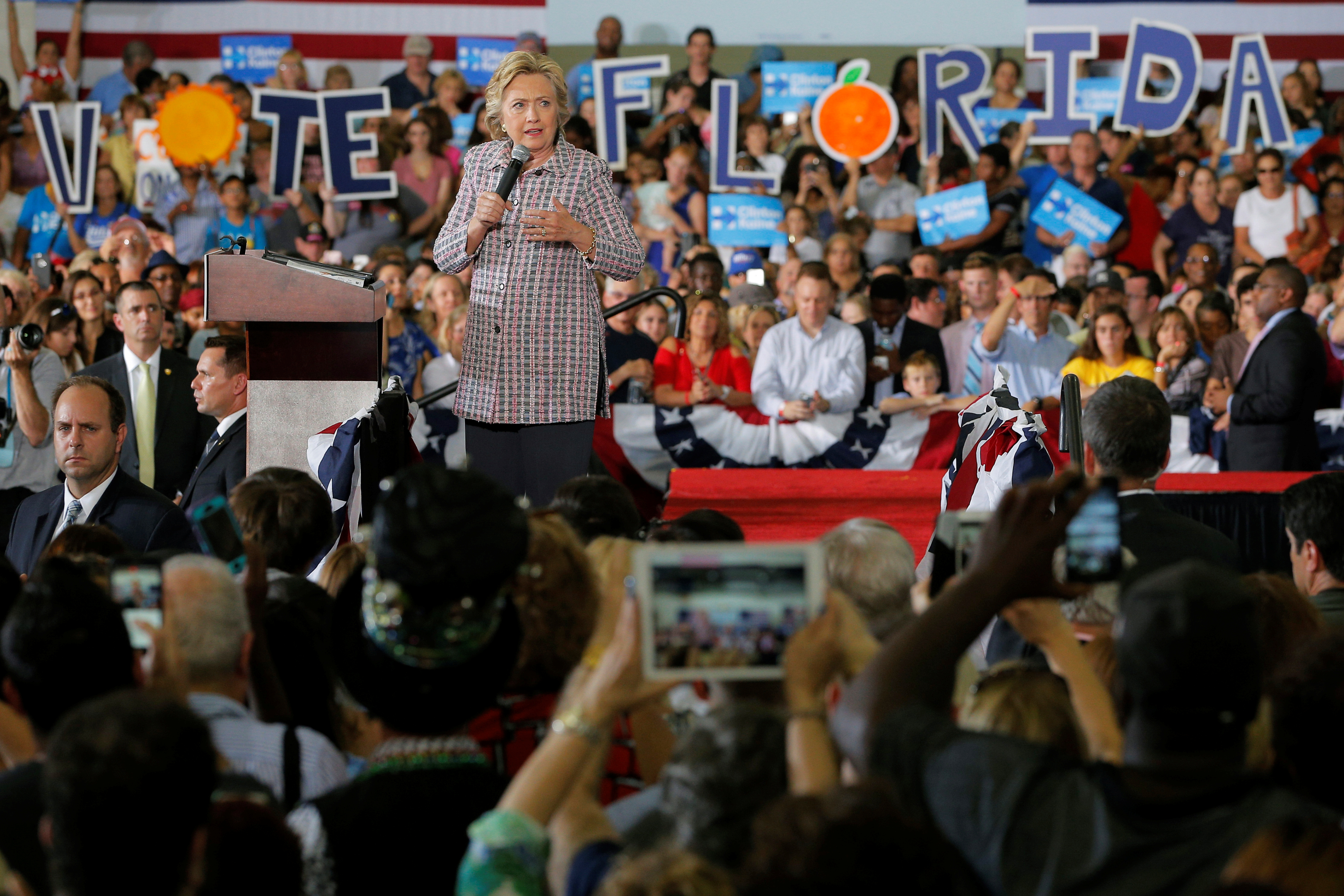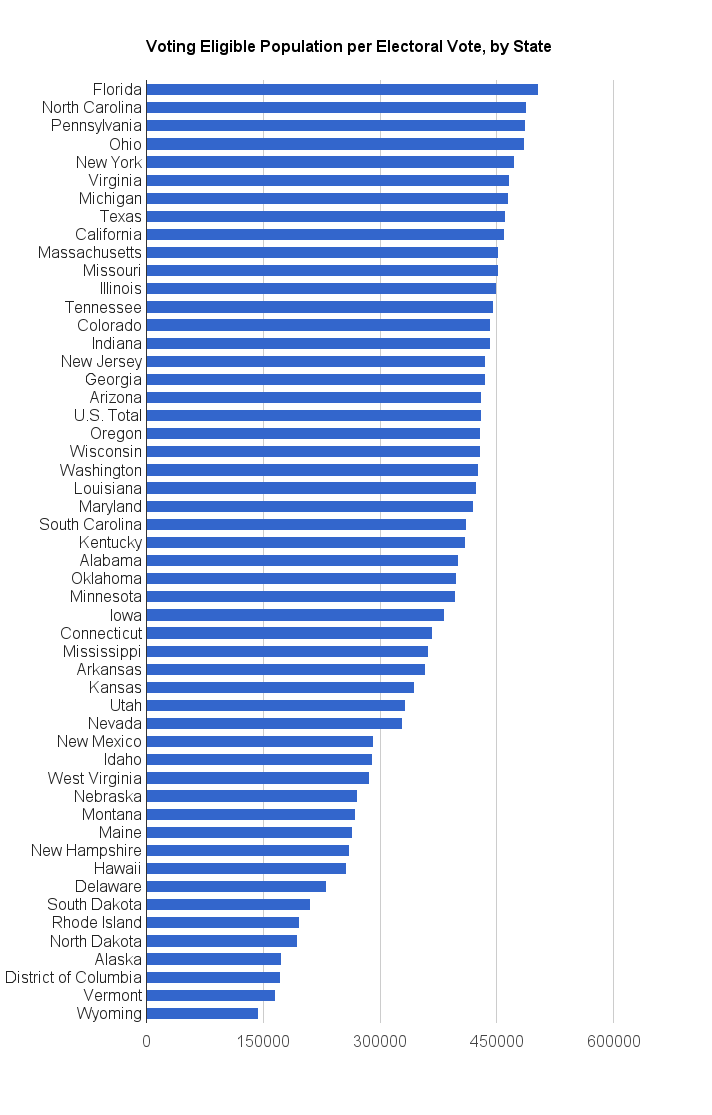Which states got screwed worst by the Electoral College in 2016?
Congratulations, California: You were only the ninth most disenfranchised state this time


One problem with Americans' fetish-worship of the Constitution is how it blinds us to the many parts of it that are utter trash. Democrats are getting their noses ground in one of the more odious bits during this election, as Hillary Clinton won the popular vote by over 2.7 million and counting, but still lost the Electoral College. That is about 2 percent of the total vote, the widest margin of popular vote victory in an Electoral College loss since 1876 — and given the massive fraud committed by white supremacists in that election, probably the widest margin ever.
Conservatives are, naturally enough, searching feverishly for any rationale to justify Donald Trump's Electoral College victory as true, righteous, and above all What the Founders Would Have Wanted. Michael Barone at the American Enterprise Institute has one candidate: to prevent an "imperial" California from imposing its will on the rest of the country.
His argument is that since California is both the largest state and leans very strongly towards one party, it's right and proper that it is partially disenfranchised by the Electoral College. Apparently restricting the vote is good so long as you do it to lots and lots of similar people who are close together. But risible analysis aside, Barone's premise isn't even correct. A careful analysis will show that California isn't even that far up the list of states treated worst by the Electoral College in 2016.
The Week
Escape your echo chamber. Get the facts behind the news, plus analysis from multiple perspectives.

Sign up for The Week's Free Newsletters
From our morning news briefing to a weekly Good News Newsletter, get the best of The Week delivered directly to your inbox.
From our morning news briefing to a weekly Good News Newsletter, get the best of The Week delivered directly to your inbox.
Taking voting-eligible population and turnout estimates from the United States Elections Project, I calculated the voting-eligible population per electoral vote for each state. The greater the number, the greater the disenfranchisement:

It turns out Florida is the most disenfranchised state under the Electoral College — and California isn't even close to the top, coming in at 9th place. Pennsylvania, North Carolina, and Ohio get top spots due to the fact that California and Texas have huge populations of non-citizens and felons who can't vote. Florida does as well, with about one out of 10 residents not a citizen, but even if you calculate electoral votes per total voting-age population (thus counting everyone who can't vote), Florida still comes out on top.
On the other hand, small states get eye-popping over-representation. The vote of a Wyoming resident counts 3.5 times as much as a Floridian. A Vermonter counts 2.9 times as much as a North Carolinian. (If any state is being subjected to "imperialism" in this system, it's the big ones.)
The theoretical maximum unfairness built into the Electoral College can be measured by looking at these small states. Imagine a two-candidate election where one candidate's support is wholly concentrated in the least representative states that add up to 270 electoral votes, which he or she wins by 50 percent plus one vote, and gets no support at all in the remaining states. Looking at the above chart starting from the bottom, this can be achieved by winning every state from Wyoming through Illinois, except New Jersey. Half of the voting-eligible population in those states adds up to 50.5 million — a mere 21.8 percent of the total voting population.
A free daily email with the biggest news stories of the day – and the best features from TheWeek.com
In other words, it is possible to win the Electoral College while losing the popular vote by nearly 4-1.
In practical terms, of course, the huge majority of all states are effectively disenfranchised under the Electoral College. Your vote only really counts if you live in a state with a fine partisan balance, which is why Florida, as a pivotal swing state, is never really considered underrepresented. Republicans in California and Democrats in Texas, meanwhile, might as well not bother to vote for president.
Taken together, we can see why the Electoral College is a garbage way to elect the president. It weights residents of small states much, much more heavily than those of large states. It allows losers to win, potentially by a very large margin. And it directs most presidential campaign attention to the handful of states that have roughly equal numbers of Republicans and Democrats.
There is no possible justification for any of these effects. It's so obviously and egregiously unfair that even apologia for the Electoral College doesn't make sense on its own terms. More states should join the National Popular Vote interstate compact to abolish this senseless anachronism.
Ryan Cooper is a national correspondent at TheWeek.com. His work has appeared in the Washington Monthly, The New Republic, and the Washington Post.
-
 How the ‘British FBI’ will work
How the ‘British FBI’ will workThe Explainer New National Police Service to focus on fighting terrorism, fraud and organised crime, freeing up local forces to tackle everyday offences
-
 The best family hotels in Europe
The best family hotels in EuropeThe Week Recommends Top kid-friendly hotels with clubs, crèches and fun activities for children of all ages – and some downtime for the grown-ups
-
 Moon dust has earthly elements thanks to a magnetic bridge
Moon dust has earthly elements thanks to a magnetic bridgeUnder the radar The substances could help supply a lunar base
-
 The billionaires’ wealth tax: a catastrophe for California?
The billionaires’ wealth tax: a catastrophe for California?Talking Point Peter Thiel and Larry Page preparing to change state residency
-
 Bari Weiss’ ‘60 Minutes’ scandal is about more than one report
Bari Weiss’ ‘60 Minutes’ scandal is about more than one reportIN THE SPOTLIGHT By blocking an approved segment on a controversial prison holding US deportees in El Salvador, the editor-in-chief of CBS News has become the main story
-
 Could Trump run for a third term?
Could Trump run for a third term?The Explainer Constitutional amendment limits US presidents to two terms, but Trump diehards claim there is a loophole
-
 Has Zohran Mamdani shown the Democrats how to win again?
Has Zohran Mamdani shown the Democrats how to win again?Today’s Big Question New York City mayoral election touted as victory for left-wing populists but moderate centrist wins elsewhere present more complex path for Democratic Party
-
 Millions turn out for anti-Trump ‘No Kings’ rallies
Millions turn out for anti-Trump ‘No Kings’ ralliesSpeed Read An estimated 7 million people participated, 2 million more than at the first ‘No Kings’ protest in June
-
 Ghislaine Maxwell: angling for a Trump pardon
Ghislaine Maxwell: angling for a Trump pardonTalking Point Convicted sex trafficker's testimony could shed new light on president's links to Jeffrey Epstein
-
 The last words and final moments of 40 presidents
The last words and final moments of 40 presidentsThe Explainer Some are eloquent quotes worthy of the holders of the highest office in the nation, and others... aren't
-
 The JFK files: the truth at last?
The JFK files: the truth at last?In The Spotlight More than 64,000 previously classified documents relating the 1963 assassination of John F. Kennedy have been released by the Trump administration
